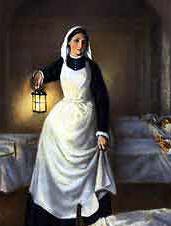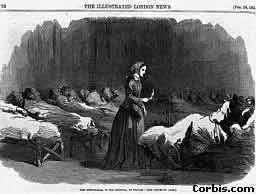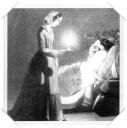"monstrous" woman of the week
 Welcome to the sixth in a series of biographical sketches that I plan to publish on Fridays. The title of “monstrous” has been given to these women as a rebuke to those who have labeled all women who do not follow their agenda for women as “monstrous.”
Welcome to the sixth in a series of biographical sketches that I plan to publish on Fridays. The title of “monstrous” has been given to these women as a rebuke to those who have labeled all women who do not follow their agenda for women as “monstrous.”These entries will briefly tell about women I believe have done many things to further the cause of Christ in America, and some even around the world, and have maintained a godly femininity while doing so. They will be women whose choices in life have also disqualified them from being given the godly woman status in some of today’s hyper-patriarchal circles, though the hypocrisy certainly has escaped some of these list keepers! Hence, the title of “monstrous” has been given to these women as a rebuke to those who have labeled all women who do not follow their stifling agenda for women as “monstrous.”
Grab a cup of coffee or tea and enjoy! Oh, and feel free to emulate.
This week's "monstrous" woman of the week is Florence Nightingale, Italian nurse and standard bearer for modern nursing practices. Her influence worldwide in the area of health care is a testimony to God's grace in her life.
Florence was born in Florence, Italy on May 12, 1820. Although Italian born, she grew up in London, England where her education included the study of Greek, Latin, German, French and Italian. Her father taught her history and philosophy while her governess schooled her in music and drawing. As part of an upper class family, Nightingale and her sister were expected to grow up as proper ladies who would "devote themselves to their family, husband, society, entertainment and cultural pursuits" (Bullough, 1993).
But Florence was driven by a different dream. She believed that her attraction to nursing was God's will, or "a calling," and because of that she made many personal sacrifices to pursue her professional life with intensity.
Her family disapproved of her decision to take up the nursing profession, which was seen in her day as a vocation for lower classes, one carried out under harsh conditions in dirty hospital environments. The family's disappointment did not deter her from her goal, and at the age of 33, having studied nursing for nine years, Florence began caring for the sick.

In 1853, she was asked to work at the Harley Street Nursing Home. There, she made improvements that included better organization and training for the staff, and she implemented a system that piped hot water to every floor. She also created a lift to bring patients their meals (Falkus, 1980).
The Crimean War began and the British army was unprepared to accommodate British battle injuries and casualties in Crimea. This led to disasters such as cholera, lack of supplies, and inadequate sanitation. British Secretary of War, Sidney Herbert asked Nightingale to take nurses and help the hospital in Scoter, Turkey. On October 21, 1854 she set out for the hospital with the 38 nurses she had trained.
Entering the hospital, Florence was appalled and horrified by what she saw. Wounded soldiers lay on straw mats that lined the room like coffins waiting for burial. The floor was covered with dirt and blood. There were no hospital gowns: the men still wore their uniforms. As Nightingale passed them, each soldier tried to act stern and tough, but their boyish faces betrayed unmistakable pain. Those who were able to conquer their convulsions lay still, as if dead.
The first change Florence made was scrubbing all the injured men's clothes. Then, she spent her own money buying bandages, operating tables and other basic necessities for the hospital. Her nurses cleaned the whole hospital so there were no more germs and this helped to stop contamination and spread of disease. She is a hero because she changed the hospital and saved lives with her determination and hard work.
Florence Nightingale also changed the profession of nursing forever. Nursing was once an occupation with little respect: people didn't think you needed any special training or skills to do it, and most nurses were poor and uneducated. It was very unusual for Florence, who came from the upper class, to work in a hospital. The hospital conditions were more sanitary after she reorganized everything. Funds and donations flooded into hospitals and the patients received better care. Hospitals around the world were changed forever, and caring for the sick became an honorable profession.
 The state of the hospital in Turkey was horrendous but even more challenging was the hostile attitude the nurses received from the doctors. Many did not even allow nurses inside the wards! It wasn't until the Battle of Inkerman, during which the British suffered many casualties and the hospitals became overcrowded that the doctors were forced to ask for help.
The state of the hospital in Turkey was horrendous but even more challenging was the hostile attitude the nurses received from the doctors. Many did not even allow nurses inside the wards! It wasn't until the Battle of Inkerman, during which the British suffered many casualties and the hospitals became overcrowded that the doctors were forced to ask for help.Florence sent reports back to London about ways to improve conditions and assumed care of the patients at night, moving about each floor comforting patients with a lamp in hand. This intimate relationship with her patients earned her the affectionate title of "Lady with the Lamp."
Through selfless devotion and sheer determination, Florence Nightingale transformed the profession of nursing forever. She gave dignity and honor to what continues to be a female-dominated profession and revolutionized hospital conditions, making them more organized and above all, sanitary. Largely because of her efforts, funds and donations flood into hospitals, allowing patients around the world to receive better care.
I solemnly pledge myself before God and in the presence of this assembly, to pass my life in purity and to practice my profession faithfully. I will abstain from whatever is deleterious and mischievous, and will not take or knowingly administer any harmful drug. I will do all in my power to maintain and elevate the standard of my profession, and will hold in confidence all personal matters committed to my keeping and all family affairs coming to my knowledge in the practice of my calling. With loyalty will I endeavor to aid the physician, in his work, and devote myself to the welfare of those committed to my care.
The Florence Nightingale Oath


3 Comments:
Wow. Thank you for the link to the monstrous movie. These things make me so sad. There were the seeds of the end of slavery in the New Testament even while preachers across the land were using the scripture to defend it. There are the seeds of the end of hierarchicalism, too.
Hang tough!
I enjoyed hearing about Florence Nightingale. I knew almost nothing about her, but that she was amazing. Nice to hear just how amazing.
Hi Kevin,
Thanks for stopping by. I hadn't linked to that site for a few weeks but thought it would help remind my readers why I am featuring my own "monstrous" women. BTW, some of my "best ladies" are still waiting in the wings! :)
The Thinklings linked me to you, but I will try to get back each week and see who's featured.
Post a Comment
<< Home